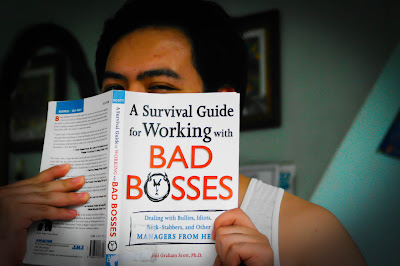A few months ago, I was able to help develop a study regarding job satisfaction. As it turns out, job satisfaction is highly complex, as it involves a mix and balance of several factors, such as pay, work environment, non-financial benefits, and work load, to name a few. However, as I look into my own work experience, a high percentage of job satisfaction, especially in corporate scenarios, is the direct superior. She/He can either make a job a living nightmare or a the best thing you've ever done in your life. In most of the exit interviews, many would not cite their boss as a reason because they would not want to offend them (this is very evident in Asian settings). But, to be honest, I believe that most of the reasons, directly or indirectly, why employees resign is their direct superior. And as I continue to analyze my situation, I have come to differentiate a good superior from a bad one. In this case, I would like to label them, naming one as a "mentor" and the other as a "boss."
By definition, a boss is "one who makes decisions or exercises authority; a professional politician who controls a party or a political machine." A mentor, however, is defined as "a wise and trusted counselor or teacher." By definition alone, you could tell the difference. And to expound on this, I have come up with a list that can tell the two apart:
- You work FOR a boss. You work WITH a mentor.
- A boss issues instructions. A mentor issues wisdom.
- A boss gives commands. A mentor gives advice.
- A boss leaves you in the dark. A mentor helps you find the light.
- The only thing a boss cares about is that you meet the objective. A mentor not only needs you to meet your objective, but also expects you to learn something from the experience.
- Success is a boss' best teacher. Failure is a mentor's best teacher.
- A boss passes on responsibilities. A mentor passes on knowledge.
- A boss's job is to make you produce output. A mentor's job is to make sure you succeed.
- When you look at a boss, you get reminded of stress. When you see a mentor, you get reminded of life.
- A boss demotivates. A mentor inspires.
- When you work for a boss, all you think about is the pay. When you work for a mentor, you actually think about doing the work.
- A boss is goal oriented. A mentor is career oriented.
- A boss can only see one year down the line. A mentor can see five.
- A boss views employees as expenses. A mentor views employees as assets.
- A boss receives credit. A mentor passes on the credit to where it is due.
- A boss is indifferent. A mentor is sympathetic.
- You always get this feeling that you are smarter than your boss. You never get that feeling with a mentor.
- For a boss, the goal is the priority. For the mentor, the employee is the priority.
- In a job interview, a boss sees an applicant. A mentor, however, sees potential.
- A boss can never be your friend. A mentor is a friend for life.
I know this list could go on and on. But, for the sake of priority, I would just highlight these 20 items. Any additional item and soon you should be paying me my consulting fees.
In my career, I have yet to find the person I can call my mentor.
